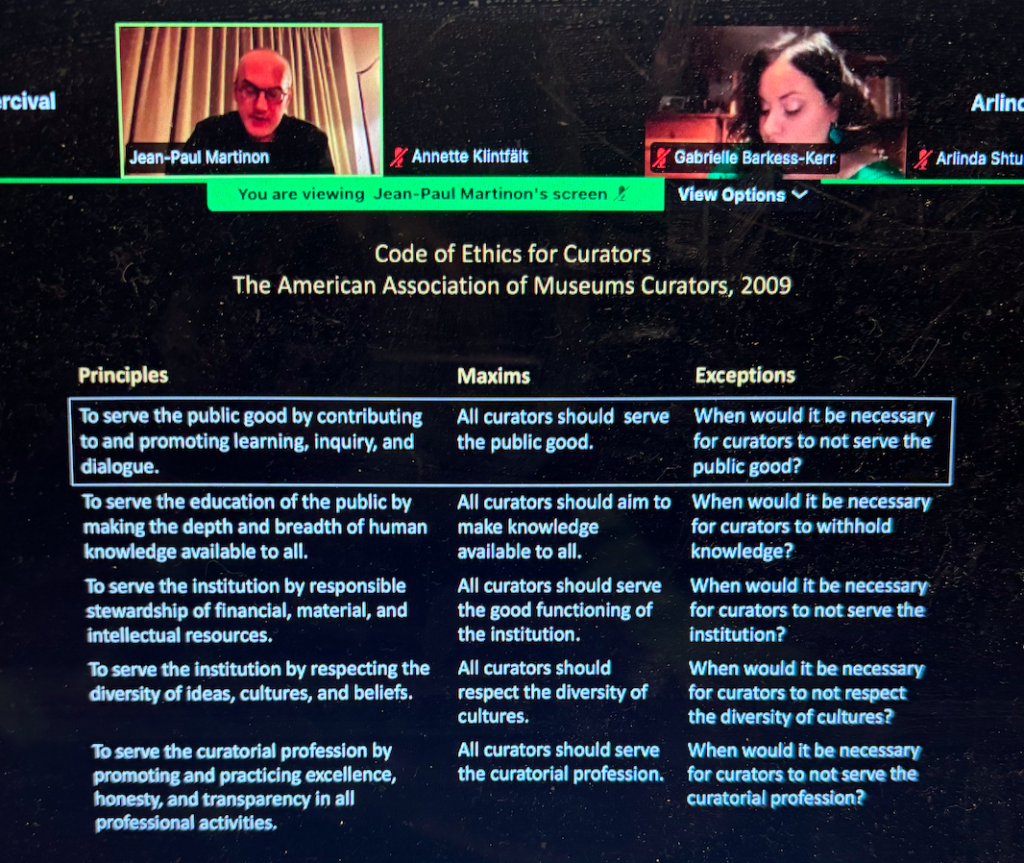To support Gabi Barkess-Kerr’s Week 4 lecture into some of the ethical considerations of curating, as well as my collective’s curatorial ethics, I chose to attend the inaugaral online lecture of the Curatorial Ethics Network (CEN). Founded by Gabi herself in 2024, the network is a ‘community of contemporary art curators focused on ethical practice, activity and discussion’ (CEN, 2025). As their first online event, Gabi hosted a talk from curator and writer JP Martinon on the ‘personalising’ of curatorial ethics. Having read the essay ‘Curating as Ethics’ by Martinon (2020) to support Week 4’s lecture, I saw this as an opportunity to engage further in his methodologies of curating ethically, centring on how he aligns ethics with his curatorial practice and how curation can arise from ethical predicaments.
Moral Bankruptcy
I found the talk very beneficial to the way I think about ethics, with regards in particular to Martinon’s proposal that we are all collectively morally bankrupt. This does not mean that we are amoral by any means, but just that globally we have progressed in such a way that we have lost our moral compass and are at constant risk of being roped in deeper to this moral destitution. As a result, the curators ethics need to be a lifelong commitment to practicing in such a way that acknowledges this. Obviously, this is a very harsh reality to hear, but later when I asked a question about if there was any hope for the cycle of 100 years of moral corruption not to continue (said in reference to Martinon’s comparison of current societal ethical affairs being equal to that of Weimar Germany), he expanded to say that there is just an overwhelming sense of bleakness of how sophisticated human complexity is. Human life can have moral uprisings, but with the increasing complexity of humanity at a rapidly exponential rate, humanity has reached a point beyond the possibility of cycles and patterns due to the speed of everyday existence.

Application
This in many ways is horrifying as a reality. No-one wants to live in an inherently corrupt world and yet that is where we find ourselves. However, this actually gave me reassurance in reference to my own personal project. If moral bankruptcy is where we are at, then instances of wholesome communication and connectivity within a community is necessary to support those seeking to slow down and simply exist in the world. Throughout my project I have maintained that I will support the community, something very important to my personal ethics, I will not support major corrupt organisations unless absolutely necessary (like not using Facebook to advertise), and I will not have any form of for-profit agenda. In doing this, my network absolutely will strive to be as accessible as possible in terms of being affordable and local, anyone is welcome to join provided they wish to engage with the project, and there will be a zero tolerance hate speech/ racist/sexist/homophobic policy strictly upheld across all workshops, events, and online forums. In doing all of these components, I hope to have a strong EDI ethical practice, as well as going beyond this to consider the environmental impact of the project, recycling where possible and reducing waste. Allowing for people to depict their everyday, I hope to create a diverse and safe environment, providing relief from this ‘moral bankruptcy’ for my network.
Martinon, JP (2020). Curating as Ethics. Minneapolis and London: University of Minnesota Press.
https://www.curatorialethicsnetwork.org/







